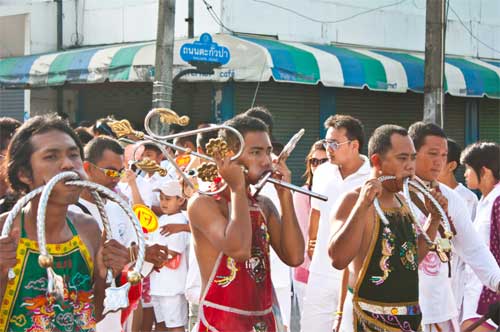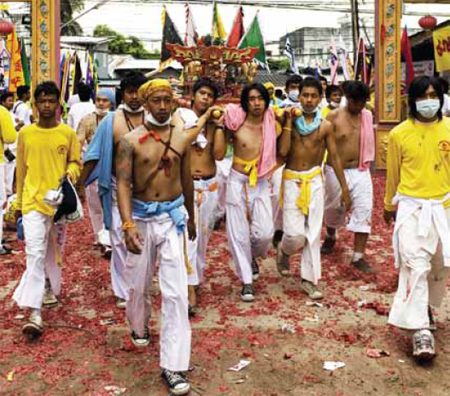ม้าทรง
เรื่องเหนือธรรมชาติ ที่เป็นเรื่องปกติ ในเทศกาลกินเจ
ของเหล่าเทพ ที่ลงมาประทับทรง มีให้ท่านพิสูจน์ด้วยสายตาตัวเอง
ในทุกๆปี การทิ่มแทงตนเองด้วยของมีคม ของแหลมต่างๆ ทั้งมีด ดาบ ขวาน
แทงทะลุเข้าไปตามร่างกายส่วนต่างๆ โดยมากมักจะแทงตามกระพุ้งแก้ม
ใบหู ผิวหนังตามแขน ขา แผ่นหลัง ซึ่งผู้ที่จะมาทำหน้าที่ม้าทรงในเทศกาล
ได้ จะต้องปฏิบัติตัวอยู่ในศีลอย่างเคร่งครัดเป็นเวลาก่อนหน้าเทศกาลนับเดือน
การแสดงอิทธฤทธิ์ของเทพ เชื่อว่าในภายหลังแผลต่างๆที่เกิดขึ้นจะเลือนหายไปอย่าง
รวดเร็ว แม้ระหว่างการประกอบพิธี ก็ไม่มีอาการเจ็บปวด ไม่ว่าจะเดินลุยไฟ ไต่บันไดมีด
กรีดด้วยของมีคมตามร่างกาย และลิ้น เหล่าม้าทรง แห่ไปตามถนนอย่างไม่สะทกสะท้าน
Vegetarian Festival
Basically Chinese in origin and practice, Vegetarian Festival has assimilated
elements from other cultures over the years and is now a unique combination
of religious piety, ritual, merry-making, and spectacular displays of supernatural powers.
The festival's origins are obscure, but it appears to have started in the mid 19th
century in the centrally-located Kratu District among Chinese who flocked to work
as tin miners. Many of these immigrants were undoubtedly familiar with the
ancient Chinese practice of turning vegetarian for a period of time,
generally during the ninth month of the lunar calendar. Abstaining from meat was
supposed to purify the body and mind, avert potential disaster, and generally
promote good fortune.
The festival's most colorful event and includes penitentiary acts of self-mutilation as the price for fullfillment of a previously requested event such as the cure of an illness or advent of financial success.
A thorough cleaning of the shrines takes place on the day before the ceremony begins.
Sandalwood and joss sticks are burned to purify the precincts. In the afternoon, a lage
post is erected before each shrine to surve as a residence for the nine spirits who preside
over the rites; their presence is symbolized by nine lamps hung on the post.
The gods are honored with vegetarian food offerings which are essentially the same
as the diet observed by believers during the festival period: rice, cabbage, beans, carrots,
pumpkins, and various fruits. People may eat this food at the temples or take it home;
all the raw materials have been donated in advance by the community.
Each temple displays a formidable array of knives, swords, axes, and other weapons which
play a prominent role in the ceremony as it is presently observed on Phuket.
It is believed that the supernatural powers of the gods are transferred to those who have
purified themselves, thus enabling believers to endure a wide variety of self-inflicted ordeals, from forcing sharp rods through their cheeks to walking on red-hot coals, without pain either during or after. There is no record of such practices being part of the Vegetarian Festival in ancient chaina, and vary likely they were borrowed from India, where self mortification is frequently found in Hindu ritual.
Another integral part of all the observances is the Bridge Crossing Ceremony, which alleviates bad fortune. The participants believe these rites will not only relieve present difficulties but also mitigate those which may lie in the future.
Finally, each temple stages a fire-walking and knife-blade climbing extravaganza.
To outsiders, these seem nothing short of miraculous, defying all physical laws, for the purified do indeed walk calmly over beds of glowing charcoal and scale ladders with rungs of razor-sharp blades.
To disprove trickery, viewers are welcome to try themselves- though the lack of volunteers is conspicuous.
on the final evening everyone gathers in the city for the grand bash, complete with non-stop firecrackers to chase away bad spirits and accompany the nine gods on their annual journey back to heaven. At midnight the last rites are perfomed, the explosions subside, and town returns to normal for another year.





No comments:
Post a Comment